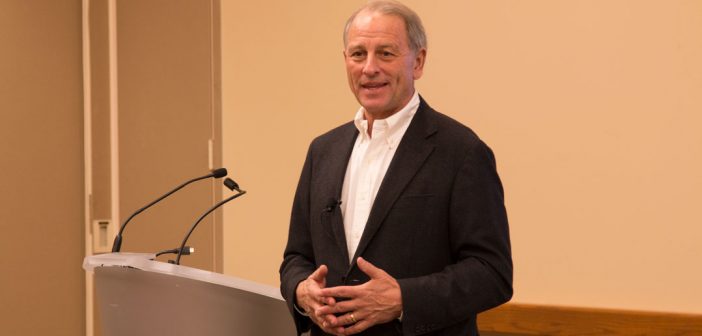When Harry Reasoner, a 60 Minutes founding correspondent, introduced the groundbreaking CBS news program to American audiences in 1968, he described it as “a magazine for television.” CBS news legend Mike Wallace, who sat alongside him during the premiere, chimed in, “And if this broadcast does what we hope it will do, it will report reality.”
Fifty years later, former CBS chairman and longtime executive producer Jeff Fager argues that 60 Minutes has undoubtedly embedded itself into the social consciousness of America.
“We were an important part of CBS, the corporation, because we were helping to educate the public about what was happening in the world,” Fager said at a Nov. 13 Q&A event sponsored by Fordham’s communications and media studies department.
Fager chronicles the iconic news program’s rise to the top in his new book, Fifty Years of 60 Minutes: The Inside Story of Television’s Most Influential News Broadcast (Simon&Schuster, 2017). Having won 138 Emmy awards and 20 Peabody awards, 60 Minutes continues to be lauded for its commitment to quality and truth, he said.
“I’m 100 percent convinced that we’re doing well because we’re feeding a hunger for real journalism in America,” he said.
He believes that the dissemination of “fake news” on social media platforms like Facebook and Twitter present a critical call-to-action for journalists.
“It gets distracting when you hear the president talk about ‘fake news’ because that’s not what he’s talking about,” he said. “He’s talking about news that he doesn’t agree with, and I’m talking about news that we know is fake that ends up in front of millions and millions of Americans.”
Interestingly, Fager said that one of 60 Minutes’ more recent broadcast successes was a candid interview with former White House Chief Strategist Steve Bannon.
“He’s one of the most controversial figures in the country, but he was fascinating,” he told the audience.
In addition to interviewing compelling subjects of our times, Fager said 60 Minutes doesn’t rely on audience research to determine what news it should cover. He credits the show’s creator Don Hewitt, who “went against everything that was conventional,” for setting the foundation for its early successes.
“We prove every Sunday night that there is a huge audience for what’s important,” said Fager.
He cited the program’s comprehensive investigation with the Washington Post into the opioid epidemic last month and its 1995 interview with tobacco whistleblower Jeffrey Wigand, as instances where 60 Minutes helped to deepen its audience member’s understanding of a familiar issue in society that they might have thought they already knew everything about.
On average, the 60 Minutes team goes through about 3,000 ideas and comes up with 100 solid ideas every year, he said.
“It’s an intense process to get a story on the air. What I love is that by the time [it] gets on the air, it really feels like it belongs there.”



